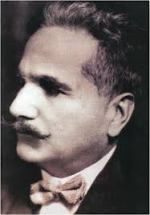Muhammad Iqbal (1877-1938) once said that he did not consider himself a poet. It is no use to compare him to Ghalib, Rumi or Tagore. There is little flight of imagination or profound silences in Iqbal’s poems. And yet, he influenced Urdu poetry.
First, Iqbal moved Urdu poetry from the classical poets’ inner world of anguish to the world of action. More than any other modern Urdu poet, Iqbal made Urdu poetry a tool for critique, a vehicle of social change, a quest for meaning and an affirmation of the human spirit. While many point to Faiz’ transformation of moth and flame into modern metaphors of revolution, it was Iqbal who first oriented Urdu poetical metaphors towards the moral and social revitalization of man and society.
Second, the musicality of Iqbal’s verse enriched the melody of Urdu. Faiz notes Iqbal’s use of unconventional metre (as in ‘Masjid-e-Qurtaba’), his use of unfamiliar (yet simple) words, his unprecedented use of proper names such as Delhi, Hejaz and Misr and his deliberate patterning of vowel and consonantal sounds, produced entire lines and quatrains that are a spectrum of sound and melody.
So, in “Ek Shaam” (‘One Evening’), Iqbal marries the picture of the hushed atmosphere over the valley to the sibilant consonants of verse (‘vaadee ke nava farosh khaamosh/kahsaar kee sabz posh khaamosh’), lulling the reader into silence. He rouses us from slumber through dramatic assonance (‘Ae Khuda Shikwah-e-Arbab-e-Wafa Bhi Sun Le/Khugar-e-Hamd Se Thora Sa Gila Bhi Sun Le’ in the poem ‘Shikwa’) and strings together sounds at the end of words (Rang ho ya Khisht-o-sang/Chang ho ya harf-o-saut) as if beating an Indian dafli drum.
Third, the range of themes and influence in Iqbal’s poetry is considerable, opening up horizons for Urdu. Through Iqbal, Urdu poetry pulses with the spirit of Keats, Nietzche, Bergson, Goethe to Rumi, Ghalib, Naziri and Bedil. His range of forms include ghazals, nazms, qita, rubiyat and mussadas verse forms; his range of subject matter, childrens’ poems, the nation, cinema, self-realization and imperialism; and his reader travels from the banks of the Ravi to the shores of Sicily to the Himalayas. Iqbal’s poetry is as much a epic history of twentieth century Asia as it is a philosophy of life.
He may not have considered himself a poet. Yet in making poetry the medium through which to express his message, Iqbal transformed the content, range and direction of Urdu poetry, suggesting an almost boundless range of place, theme and subject.
Written by Randeep Singh
Further Reading:
V.G. Kiernan (trans.), Poems from Iqbal: Renderings in English Verse with Comparative Urdu Text (Oxford University Press, Pakistan: 2013).
Sheema Majeed (ed.), Culture and Identity: Selected English Writings of Faiz (Oxford University Press, Karachi: 2005).
Barbara Metcalf, “Iqbal’s Imagined Geographies: The East, the West, the Nation, and Islam” in Kathryn Hansen and David Lelyveld, A Wilderness of Possibilities: Urdu Studies in Transnational Perspective (eds.) (Oxford University Press, New Delhi, 2005).
Iqbal Singh, The Ardent Pilgrim: An Introduction to the Life and Work of Mohammad Iqbal . (Oxford University, New Delhi: 1997).
